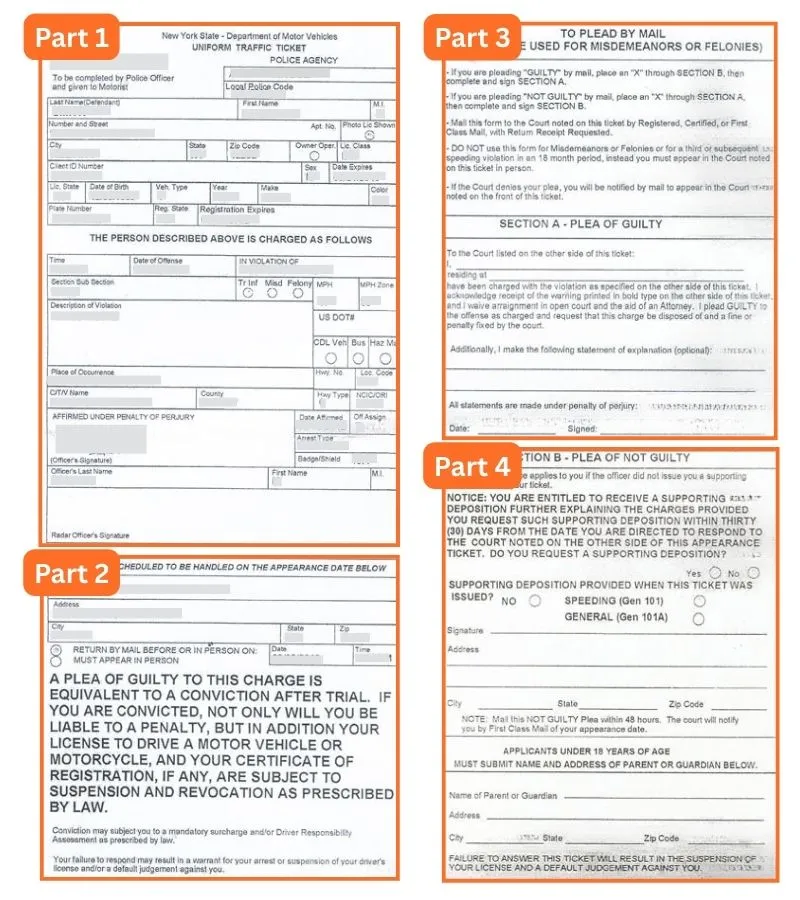One of the most common violations in New York, speeding can result in hefty fines, points on your license, and higher insurance premiums. The faster you drive over the limit, the steeper the penalties.
Using your phone while driving is taken seriously. Even holding your phone to talk or text can lead to fines and points, and repeat offenses carry harsher consequences.
This is more than just speeding — it includes aggressive or unsafe behavior on the road. Reckless driving is a misdemeanor in New York and can lead to license suspension or even jail time.
Failing to stop at a red light or stop sign is a common ticket that puts drivers at risk for fines and points, and it can also raise your insurance rates.
Not yielding the right-of-way, whether to pedestrians or other drivers, often results in tickets and can contribute to accidents, making it a frequent violation in busy areas.
New York requires all drivers to carry insurance. If you’re caught without valid coverage, you could face fines, suspension of your registration, and even loss of your driver’s license.
To say it simply – we are your best chance at winning. Our pro lawyers have years of experience in courts, successfully slamming thousands of tickets.
We let you know if there’s a win in sight or if your ticket’s a lost cause. You can enjoy not being taken for a ride, just simple straight talk.
Submit your ticket and step back. We offer a valet-like service, taking on the mental load of your ticket, so you don’t have to.
Forget automated responses; at Flickit, you’re guaranteed support from real, empathetic humans – every step of the way. Message us and expect a call-back!
Leave the courtrooms to TV shows. Flickit handles all the real-life legal stuff, because who has time or patience for all that drama?
By keeping your license points down, you’ll avoid your insurance premiums from rising. That’s a lot of money at stake down the line.

This section is completed by the police officer at the time of the traffic stop. It includes:
• Driver’s personal details (name, address, date of birth, license info).
• Vehicle details (plate number, registration, make, year, color).
• The exact violation (law section, description of offense, time and place).
• Officer’s signature and badge info.
👉 Purpose: Identifies who you are, your vehicle, and the law you’re accused of breaking. This is the “official charge” record.
This area explains what happens if you plead guilty. Key points:
• A guilty plea is treated the same as a conviction after trial.
• You may face fines, penalties, license suspension or revocation, and higher insurance costs.
• For some offenses, mandatory surcharges or Driver Responsibility Assessments may apply.
👉 Purpose: Warns you of the serious consequences of admitting guilt. It ensures you understand pleading guilty means you give up your right to a trial.
If you want to plead guilty without appearing in court:
• Check the “Plea of Guilty” box and complete this section.
• Sign and mail the form to the address on the ticket (usually the court listed).
• You may write a short explanation, but the guilty plea will stand.
• Not valid for misdemeanors or felonies (only traffic infractions).
👉 Purpose: Provides a convenient way to accept responsibility and pay fines without appearing in court.
If you want to fight the ticket:
• Check the “Plea of Not Guilty” box and mail it within 48 hours.
• You may request a supporting deposition (officer’s detailed statement of the violation).
• The court will then notify you of a hearing date.
• Applicants under 18 must include a parent or guardian’s details.
👉 Purpose: Protects your right to contest the ticket and present your case in court.
It depends how heavy your foot was:
• 1–10 mph over: $45–$150 + surcharge
• 11–30 mph over: $90–$300 + surcharge
• 31+ mph over: $180–$600 + surcharge
You’ll also get 3–11 points slapped on your license. Hit 11 points in 18 months and your license is toast. Rack up 6+ points and you’ll pay an extra $300+ in state fees over 3 years.